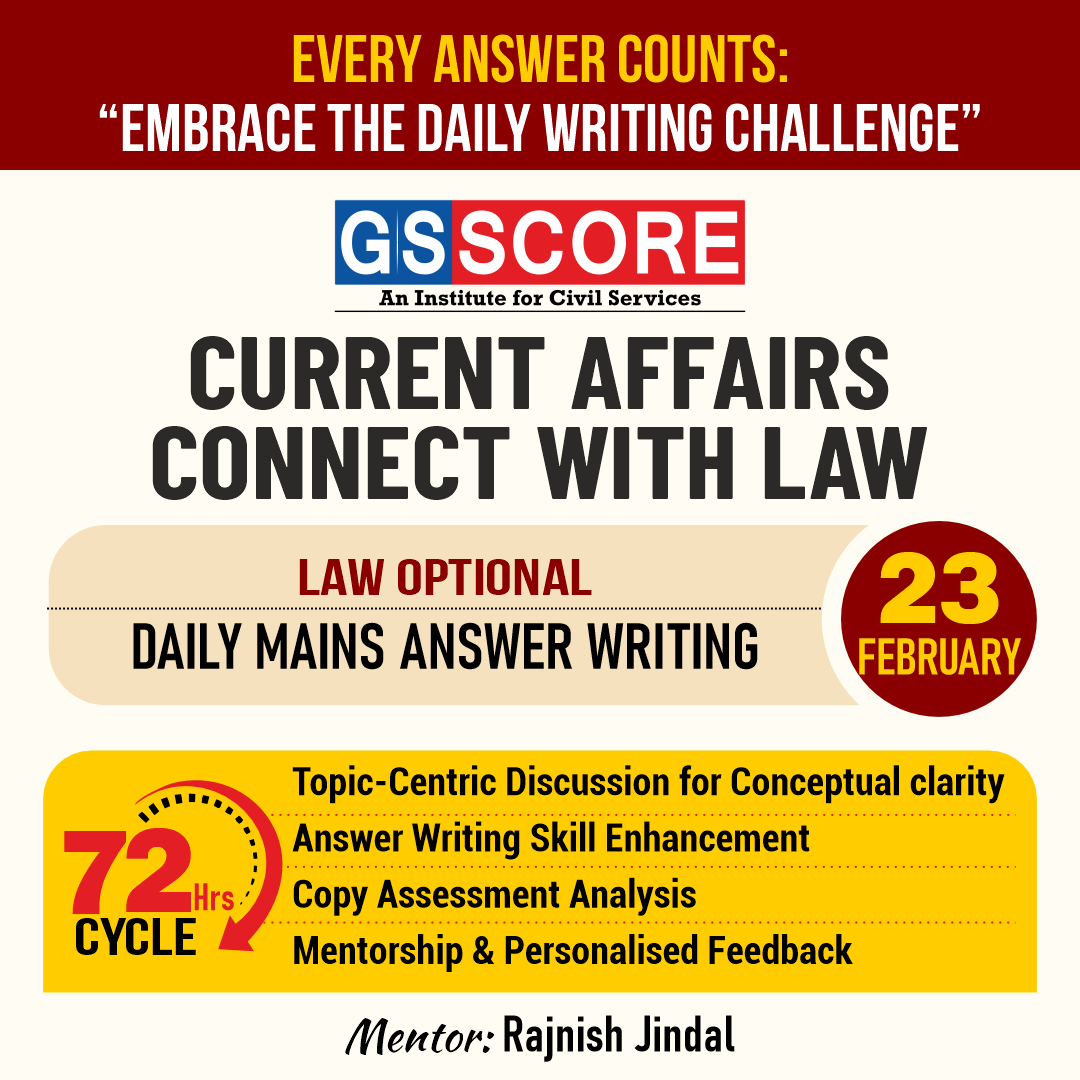


Instruction:
- There will be 2 questions carrying the First Question is-10 marks Write your answers in 150 words and the Second Question is-15 marks Write your answers in 250 words.
- Any page left blank in the answer-book must be crossed out clearly.
- Evaluated Copy will be re-uploaded on the same thread after 2 days of uploading the copy.
- Discussion of the question and one to one answer improvement session of evaluated copies will be conducted through Google Meet with concerned faculty. You will be informed via mail or SMS for the discussion.
Question #1. Critically analyze the laws related to remission of sentences in India with reference to recent decided case laws. 10 marks (150 words)
Question #2. The Supreme Court recently held that the Governor of a State can pardon prisoners, including death row ones and as the Constitution of India provides pardoning power to the executive as well. Explain the pardoning powers of the Governor and discuss how it differs from pardoning powers of the President. 15 marks (250 words)
(Examiner will pay special attention to the candidate's grasp of his/her material, its relevance to the subject chosen, and to his/ her ability to think constructively and to present his/her ideas concisely, logically and effectively).
STEPS & INSTRUCTIONS for uploading the answers
Step 1 - The Question for the day is provided below these instructions. It will be available at 7:00 AM.
Step 2 - Uploading of Answers : Write the answer in A4 Sheet leaving proper margins for comments and feedback and upload the PDF in MY ACCOUNT section. Click on the option of SUBMIT COPY to upload the PDF.
Step 3 - Deadline for Uploading Answers: The students shall upload their answers by 7:00 PM in the evening same day. The first 50 copies will be evaluated.
Step 4 - Feedback : Mentors will give their feedback for the answers uploaded. For more personalised feedback, join our telegram channel by clicking on the link https://t.me/mains_answer_writing_cse . A one-to-one session will be conducted with the faculty after copy evaluation in 72 Hrs.
Model Answer
Question #1. Critically analyze the laws related to remission of sentences in India with reference to recent decided case laws. 10 marks (150 words)
Recently, the Supreme Court nullified the Gujarat government’s decision to grant remission to 11 convicts involved in the gangrape of BilkisBano and the murder of seven of her family members during the 2002 riots in the state.
Remission of sentences: Remission implies the executive’s power to reduce the period of sentence without reducing its character. For example, a sentence of rigorous imprisonment of 3 years can be remitted to rigorous imprisonment of 2 years. Remission is rooted in the logic that, ultimately, prisons are meant to be rehabilitative spaces rather than simply being an instrument to carry out retributive punishment.
Prison Rules: Prison is a State subject which allows the state government to frame prison rules. As a result, prison rules of each State identify certain reformative and rehabilitative activities that the prisoners can undertake in order to earn remission in the form of days. The total number of days earned in remission is deducted from the actual sentence imposed by the court.
Constitutional Provisions with respect to Remission:The State has the power to suspend, remit, or commute the sentences of convicts under the Constitution of India and the Code of Criminal Procedure.
- Article 72: The President has the power to pardons,reprieves, respites, or remission of punishment or tosuspend remit or commute the sentence of any personconvicted of any offence.
- Article 161: Power of the Governor to pardon, reprieve, respite a punishment or suspend, remit, or commutethe sentence, which is given on the basis of the laws prevalent in the State, to which the executive power ofthe State extends.
- 432 of CrPC: Section 432 of Code of Criminal Procedure 1973 deals with the issue ofremission.
In MaruRam v. Union of India, Apex Court had highlighted the need to consider post-conviction conduct while assessing the suitability of convicts for remissions and early release. In the Kehar Singh v. Union of India, it was noted that prisoners can't be denied the chance for sentence remission. Denial would violate rehabilitation principles and confine convicts indefinitely and would be an anathema to the principle of reformation. In State of Haryana v. Mahender Singh and Ors., Supreme Court observed that while convicts lack a fundamental right to remission or cannot claim mercy as a matter of right, the State must evaluate cases individually based on relevant factors, in exercise of its executive functions. The Court deemed the right to be considered for remission a legal entitlement, aligned with constitutional safeguards enshrined under Article 20 and Article 21 of the Constitution. This decision essentially brings out the essence that the power to grant clemency is more of a policy nature instead of a judicial one as it rests upon the prerogative of the executive as releasing a prisoner through remission isn't a charitable gesture but a legal obligation fulfilled upon meeting set criteria. Remission is earned through good behavior of the convict post-conviction in a prison or correctional facility.
Current Debate:
- The premature release raised legal concerns, primarily as the remission application should have been considered by the appropriate State government, which, in this case, was Maharashtra, where the sentencing occurred.
- Furthermore, the presiding judge's opinion, a mandatory requirement under the CrPC, was not sought.
- The Supreme Court, in its previous rulings such as LaxmanNaskar versus Union of India (2000) and Sangeet versus State of Haryana (2012), established guidelines for remission consideration.
- The court emphasized that remission should be granted on a case-by-case basis and not in a 'wholesale manner.'
- The Gujarat government's 2014 revision of the 'Remission policy' excluded remission for those convicted of rape and murder, but the 2022 remission was based on the 1992 policy without such exclusions.
Supreme Court's Ruling:
- In its recent order, the Supreme Court unequivocally declared the Gujarat government as inappropriate for considering the remission petitions.
- The court deemed its previous order, directing the Gujarat government to consider the petitions, as null and void due to fraud and suppression of facts.
- The 11 convicts were ordered to surrender to jail authorities within two weeks.
- The Supreme Court's ruling has reaffirmed faith in the judicial system and the 'rule of law.'
- The Maharashtra government is now tasked with considering the remission petitions in accordance with legal guidelines, particularly those outlined in the LaxmanNaskar case, emphasizing that crimes affecting society at large deserve no wholesale mercy.
This case highlights the importance of strict adherence to legal procedures and the need for consistent and updated remission policies in the Indian legal framework.
Question #2. The Supreme Court recently held that the Governor of a State can pardon prisoners, including death row ones and as the Constitution of India provides pardoning power to the executive as well. Explain the pardoning powers of the Governor and discuss how it differs from pardoning powers of the President. 15 marks (250 words)
The Supreme Court ordered the release of A G Perarivalan, one of the seven convicts in the Rajiv Gandhi assassination case. The Supreme Court exercised its special powers under the Article 142 of the Constitution to order the release. The order came 24 years after Perarivalan was sentenced to death in the case by a lower court. The case holds immense significance as it has given more clarity on the scope of the pardoning powers of the Governor under Article 161 of the Indian Constitution.The power of pardon is the power to relieve a person of the legal sanctions imposed for illegal conduct - was reluctantly put in the hands of the President by the constitutional conventions of a nation.Under Article 72 President has the power to grant pardon and under article 161 Governor of a state has the power to grant pardon.Such power is in exercise of the power of the sovereign, though the Governor is bound to act on the aid and advice of the State Government.
Pardoning powers of Governor of a state:
- Power of Governor to grant pardons, etc, and to suspend, remit or commute sentences in certain cases The Governor of a State shall have the power to grant pardons, reprieves, respites or remissions of punishment or to suspend, remit or commute the sentence of any person convicted of any offence against any law relating to a matter to which the executive power of the State extends.
- The Governor of a State shall have the power to grant pardons, reprieves, respites or remissions of punishment or to suspend, remit or commute the sentence of any person convicted of any offence against any law relating to a matter to which the executive power of the State extends.
- Thus, this Article empowers the Governors of States to grant pardon, reprieves, respites or remissions of punishment or suspend, remit or commute the sentence of a person convicted of an offence against a law relating to a matter to which the executive powers of the State extends.
- Recently, the Supreme Court held that the Governor of a State,using his powers under Article 161 of the Constitution, can pardon prisoners, including death row ones, even before they have served a minimum 14 years of prison sentence.
- Such power is in exercise of the power of the sovereign, though the Governor is bound to act on the aid and advice of the State Government. Thus, the Governor could exercise his remission powers under Article 161 only on the aid and advice of the council of ministers headed by the chief minister.
Difference between pardoning powers of President and Governor:
|
President |
Governor |
|
i. He can pardon, reprieve, respite, remit, suspend or commute the punishment or sentence of any person convicted of any offence against a Central law. ii.He can pardon, reprieve, respite, remit, suspend or commute a death sentence. He is the only authority to pardon a death sentence. iii. He can grant pardon, reprieve, respite, suspension, remission or commutation in respect to punishment or sentence by a court-martial (military court). |
i. He can pardon, reprieve, respite, remit, suspend or commute the punishment or sentence of any person convicted of any offence against a state law. ii. He cannot pardon a death sentence. Even if a state law prescribes for death sentence, the power to grant pardon lies with the President and not the governor. But, the governor can suspend, remit or commute a death sentence. iii. He does not possess any such power.
|
The pardoning power of Executive is very significant as it corrects the errors of judiciary. It eliminates the effect of conviction without addressing the defendant’s guilt or innocence. The process of granting pardon is simpler but because of the lethargy of the government and political considerations, disposal of mercy petitions is delayed. Therefore, there is an urgent need to make amendment in law of pardoning to make sure that clemency petitions are disposed quickly.


